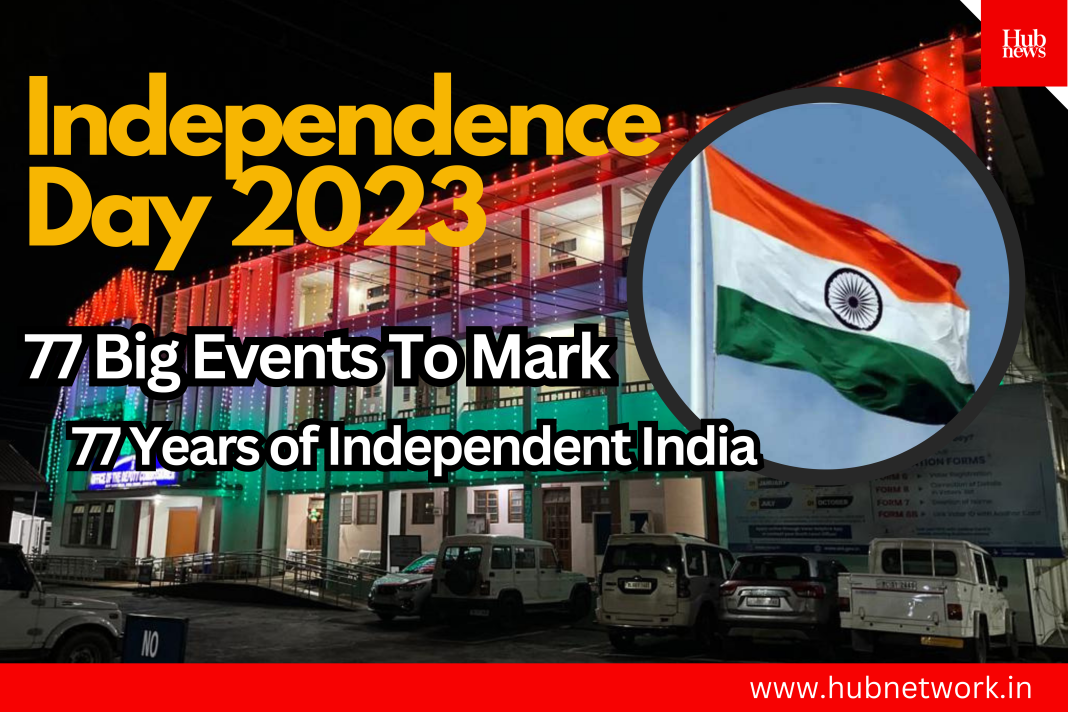India is enthusiastically celebrating the 77th year of Independence by hoisting the tricolour and singing the national anthem and patriotic songs at the country’s missions.
Apart from the leaders in the country, world leaders and individuals from across the world came forward to congratulate India on the occasion of its 77th Independence Day.
We bring to you 77 events that helped shape the 77 years of Independent India. These events reflect the resilience and progress of the nation, showcasing India’s journey towards becoming a global powerhouse. From the momentous day of independence in 1947 to the recent achievements in space exploration and economic growth, these events highlight the indomitable spirit of India and its people.



Check out these remarkable moments here:
- 1947: India was free from British rule, and partition happened on August 15. The struggle for independence led by Mahatma Gandhi and other freedom fighters finally bore fruit, paving the way for a new era of self-governance and democracy in India.
- 1948: The Father of the Nation, Mahatama Gandhi, was assassinated on January 30 He was shot around 5:12 pm by Nathuram Godse at the Birla House compound in Delhi. Godse fired two shots on Mahatama Gandhi.
- 1950: Although India became a free nation on August 15, 1947, it was declared a sovereign, democratic, and republican state after adopting the Constitution on January 26, 1950.
- 1951: The First Five-Year Plan, which focused on the development of the primary sector, was first launched in 1951.
- 1952: The first Lok Sabha general election was held in India between October 25, 1951, and February 21, 1952. This was the first election held after Independence.
- 1955: On July 1, 1955, the State Bank of India (SBI) was founded. The Government nationalised the Imperial Bank of India and renamed it to the State Bank of India.
- 1959: On April 3rd, 1959, India granted political asylum to the Dalai Lama.
- 1961: Operation Vijay was carried out for the first time in December, which involved air, resulting in the liberation of Goa, Daman and Diu from 450 years’ Portuguese rule.
- 1962: China attacked India on October 20, soon after the diplomatic visit of Chinese Premier Zhou. The India-China War, which lasted for almost a month, ended after China declared a ceasefire on November 21.
- 1963: On November 21, India’s first rocket was launched, it took off from Thumba on the outskirts of Thiruvananthapuram, announcing the birth of India’s modern space age.
- 1965: The India-Pakistan War, also known as the Second India-Pakistan War, was an armed conflict. This war took place from April-September. This war started following Pakistan’s Operation Gibraltar.
- 1966: India signed a peace agreement with Pakistan, in the USSR on January 20. This happened a day after then PM Lal Bahadur Shastri died after signing of the treaty.
- 1966: History was created on January 24 after Indira Gandhi became the first woman to be the Prime Minister of India.
- 1966: The Green Revolution started in India-introducing high-yielding varieties of rice and wheat to increase food production in order to alleviate hunger and poverty.
- 1967: The Sino-Indian War of 1967 took place where clashes between India and China alongside the border of the Himalayan Kingdom of Sikkim happened. The war took placein Nathu La and Cho La- The Nathu La and Cho La.
- 1969: The Indian Space Research Organisation was formed in this year.
- 1971: On December 1971, the Bangladesh Liberation War took place in East Pakistan which resulted to the formation of Bangladesh.
- 1974: This year on May 18, India successfully tested its first nuclear bomb in Rajasthan’s Pokhran also known as operation Smiling Buddha.
- 1975: On May 16, Sikkim became a part of India. It became the 22nd state of the Union of India.
- 1975: Emergency was imposed on June 25 by then Prime Minister Indira Gandhi.
- 1975: India launched its first satellite Aryabhata on April 19, by a Soviet Kosmos-3M rocket from Kapustin Yar.
- 1977: Morarji Desai became the first non-Congress Prime Minister after the Janata Party-led umbrella alliance defeated Congress in the general election.
- 1979: The Mandal Commission was set up by Moraji Desai government.
- 1983: Bhanu Athaiya became the first Indian to win an Oscar on April 11 for costume design for Richard Attenborough’s film, ‘Gandhi’.
- 1983: On June 25, India won first cricket World Cup defending champions West Indies in the final.
- 1984: Rakesh Sharma became the first and only Indian citizen to travel in space on April 3. Sharma spent 7 days, 21 hours and 40 minutes aboard the Salyut 7 space station.
- 1984: Operation Blue Star was carried out between 1 and 10 June 1984 to remove Jarnail Singh Bhindranwale and their followers from the Golden Temple building in Punjab.
- 1984: On October 24, India’s first metro was commissioned in Kolkata.
- 1984: On October 31, Prime Minister Indira Gandhi was assassinated at 9:29 am at her residence in New Delhi. She was shot dead by her Sikh bodyguards Satwant Singh and Beant Singh in the aftermath of Operation Blue Star.
- 1984:On December 2, the Bhopal Gas tragedy happened-also known as a chemical accident at the Union Carbide India Limited (UCIL). The Bhopal gas tragedy is known and considered as the world’s worst industrial disasters which killed thousands of people and over 500,000 people were exposed to methyl isocyanate (MIC) gas.
- 1990: The Jammu and Kashmirstarted to witness the beginning of the mass exodus of Kashmiri Pandits on January 19, followed by a genocidal campaign launched by terrorists.
- 1991: On May 21, Rajiv Gandhi was assassinated at Tamil Nadu’s Sriperumbudur by a woman suicide bomber of LTTE.
- 1991: Finance Minister Manmohan Singh started the economic reforms that liberalised the economy on July 24.
- 1992: The 16th-century Babri Masjid in the city of Ayodhya in Uttar Pradesh was demolished by a large group of Kar Sevaks from VHP and allied organisations on December 6.
- 1992: One of the biggest market manipulation was carried out by Harshad Mehta with the help of other bankers and politicians resulting to the biggest Indian stock market crash till then.
- 1993: On March 12, terrorist bombings rocked Bombay planned by Dawood Ibrahim resulting in 257 fatalities and 1,400 injuries.
- 1995:India mobile age started on July 31, when then the Union Telecom Minister Sukh Ram dialled erstwhile Bengal CM Jyoti Basu from his Nokia mobile phone.
- 1998: On May 11, the Pokhran-II nuclear tests were conducted at the Indian Army’s Pokhran Test Range at 3.45 p. The code name was Operation Shakti.
- 1999: This was for the first time when a non-Congress govt was formed by NDA under the leadership of Atal Bihari Vajpayee. He served for 5 year term
- 1999: On February 19, Atal Bihari Vajpayee took a bus ride to Lahore, Pakistan as a part of a confidence-building measure.
- 1999: From May to July, the Kargil War was fought between India and Pakistan in the Kargil district of Jammu and Kashmir.
- 1999: On December 24, an Indian Airlines Airbus A300 en route to Delhi’s Indira Gandhi International Airport was hijacked =and was flown to several locations before it landed in Kandahar, Afghanistan.
- 2001: Earthquake devastated the town of Bhuj on January 26, the day when India was celebrating its 52nd Republic Day.
- 2001: Parliament House was attacked on December 13.
- 2002: The Godhra train incident happened on February 27 which resulted to the death of 58 Hindu pilgrims returning from Ayodhya. This resulted to the communal violence in Gujarat which resulted to theat least deaths of 790 Muslims and 254 Hindus, hundreds of people went missing, and several others were left injured.
- 2004: Congress under the leadership of Sonia Gandhi managed to win 145 Lok Sabha seats to form the government with Manmohhan Singh at helm.
- 2004: An earthquake of magnitude 8.6 hit the coast of Sumatra resulting to a deadly tsunami that claimed thousands of human lives across 5 countries including India.
- 2006: Explosions were reported in local trains that rocked the city of Mumbai. Several people lost their lives and were injured in these terrorist attacks.
- 2007: Pratibha Patil took oath as the 12th President of India on July 25, becoming the first woman to hold the highest constitutional office in the country.
- 2007: In the final of the inaugural T20 World Cup, India defeated Pakistan by 5 runs in Johannesburg on September 24.
- 2008: ISRO launched Chandrayaan-1 to the Moon on October 22. Chandrayaan-1 was India’s first lunar probe under the program.
- 2008: 10 Pakistani terrorists arrived in Mumbai by the sea route and opened fire indiscriminately at multiple places in Mumbai killing several people including security personnel.
- 2009: The UPA Government launched the Unique Identification Authority of India (UIDAI)-Aadhar for issuing unique identification numbers.
- 2010: The Right to Education Act was passed on August 4 in the Parliament of India. The main motive behind thus act was to ensure free and compulsory education for children between 6 and 14 in India under Article 21a of Indian Constitution.
- 2010: In 2010, India hosted the first Commonwealth Games in Delhi. This was one of the most successful Commonwealth Games to date with Indian athletes winning 38 gold, 27 silver and 36 bronze medals.
- 2011: MS Dhoni-led Team India lifted their second Cricket ODI World Cup on April 2 at the Wankhede Stadium in Mumbai. Team India defeated Sri Lanka by six wickets in the final.
- 2011: Veteran Gandhian Anna Hazare demanded enactment of a comprehensive Jan Lokpal Bill to check corruption and went on a fast-unto-death in Delhi.
- 2012: A 23-year-old medical student was brutally gang-raped on a moving bus in the national capital by six men.
- 2013: ISRO launched Mangalyaan on November 05.
- 2014: Narendra Modi became the 14th Prime Minister of India after BJP won 282 seats, while NDA won 336 seats.
- 2015: On January 1, the Narendra Modi-led NDA government replaced the Planning Commission with Niti Aayog.
- 2016:A deadly terror attack was carried out by four JeM terrorists from Pakistan in Indian Army brigade headquarters near the town of Uri in Jammu and Kashmir. In this terror attack 19 Indian soldiers were killed. Following this, India carried out surgical strikes in PoK.
- 2016: On November 8 at 8 pm, PM Modi announced the demonetisation.
- 2018: The Indian Government launched Goods and Services Tax (GST) On the midnight of July 1.
- 2018: The Supreme Court decriminalised Section 377 on September 6.
- 2019: A suicide attack carried out by LeT militants killing 40 CRPF jawans in Jammu & Kashmir’s Pulwama on February 14, followed by the retaliatory Balakot strikes on February 26 by the Indian Air Force (IAF).
- 2019: Articles 370 and 35(A) were nullified on August 5 and the state was divided into two separate union territories, namely Union Territory of Jammu and Kashmir and Union Territory of Ladakh.
- 2019: November 9, the Supreme Court historic verdict was made on the construction of a Ram Temple at the disputed site at Ayodhya.
- 2020: The first wave of covid-19 pandemic was witnessed in India and world.
- 2021: India was badly hit by the second wave of covid 19, where thousands of people lost their lives.
- 2021: The Mod-led government rolled back the three laws aimed at reforming India’s agriculture sector following protest by farmers in the national capital.
- 2021: On January 16, Manish Kumar, a 34-year-old sanitation worker at Delhi’s All India Institute of Medical Sciences (AIIMS) was vaccinated against the coronavirus disease. He became the first person in India to be vaccinated against the covid19 virus.
- 2022: Air India was sold to the Tatas by the Indian Government. On January 27, the Tata regained the ownership of the airline after nearly 70 years.
- 2022: The government of India sold 3.5 per cent stake in India’s largest-ever IPO.
- 2022: Droupadi Murmu won the Presidential election on July 21 becoming the first citizen from a tribal community for the first time in the history of the independent India.
- 2023: July 14, India launched chandrayaan-3, its third Moon mission, aiming to be the first to land near its little-explored south pole.
- 2023: August 11, Amit Shah introduced three bills in the Lok Sabha as substitutes for the Indian Penal Code, the Code of Criminal Procedure, and the Indian Evidence Act—laws that originated during the British colonial era.


Also Watch
Find latest news from every corner of Northeast India at hubnetwork.in, your online source for breaking news, video coverage.
Also, Follow us on-
Twitter-twitter.com/nemediahub
Youtube channel- www.youtube.com/@NortheastMediaHub2020
Instagram- www.instagram.com/nemediahub





